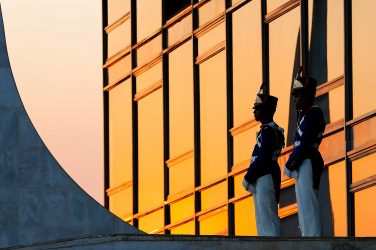 Cristiano Zanin Martins, lawyer for Brazil’s former President Luiz Inácio Lula da Silva and his wife Marisa Letícia, said it strikes him as noteworthy that actions under Operation Car Wash which target his client are always conducted at key moments in the country’s politics, referring to the conclusion of the impeachment trial of suspended President Dilma Rousseff at the Senate.
Cristiano Zanin Martins, lawyer for Brazil’s former President Luiz Inácio Lula da Silva and his wife Marisa Letícia, said it strikes him as noteworthy that actions under Operation Car Wash which target his client are always conducted at key moments in the country’s politics, referring to the conclusion of the impeachment trial of suspended President Dilma Rousseff at the Senate.
The Brazilian Federal Police is seeking charges of passive corruption, misrepresentation, and money laundering against Lula and his wife as part of an investigation into the acquisition of a triplex apartment in Guarujá, on the coast of São Paulo.
In March, shortly before the motion for Rousseff’s impeachment was approved by the lower house, Lula was coercively taken by the Federal Police for questioning at the Congonhas Airport, in São Paulo, under Operation Car Wash.
“There is a very strong political element to it, as he has been the victim of arbitrary acts, carried out with purposes strange to the case, like the release of intercepted conversations[…], concomitant with the political moments of the country,” said the lawyer.

Martins further stated that Federal Police Commissioner Marcio Adriano Anselmo, who penned the investigation report, is in no condition to conduct a probe against his client, as he has proved biased against Lula on social media.
“It is very clear that this person is not neutral, and it would be his duty under the law to declare himself partial,” he declared.
OAS Property
According to Anselmo, Lula and his wife were the “beneficiaries of unlawful advantages” in the refurbishment of the apartment and the storage of goods belonging to the former president in a deposit.
The couple’s counsel, however, refers to the police report as “a piece of fiction,” as it is based on “false premises and grave legal errors.”
Lula and Marisa Letícia, Martins says, are not the owners of the property, and therefore should not be held accountable for the renovation works, adding that the ownership of the property can be found registered at the Office of Real Estate Registry of Guarujá under the name of the construction company OAS.
After the motion is filed by the Federal Police, federal prosecutors may officially indict Lula and Marisa Letícia with the crimes listed in the document, shelve the case, or request new inquiries.
Defending Rousseff
Former Finance Minister Nelson Barbosa said the enactment of supplementary credit decrees by suspended President Dilma Rousseff has followed the same protocol for over ten years. Barbosa made the statement in his testimony Saturday, August 27, as a defense witness in Rousseff’s impeachment trial.
In the first hour of hearings at the Senate, Barbosa added that decrees are penned by “experienced public officials” and bring more freedom to the administration of funds when budget is limited.
Barbosa noted that 32 such transactions were carried out in 2009, all of which fully approved by the Federal Court of Accounts (TCU).
The presence of Barbosa as a witness is linked to one of the allegations in the motion calling for Rousseff’s ouster. The suspended president is accused of enacting supplementary budget decrees without congressional permission.
Also held against her are delayed payouts to public banks in charge of government initiatives, like special credit for farmers, or the Bolsa Família conditional cash transfer program, which forced banks to use their own resources for funding.
The money the government refrained from transferring is still taken into account, which masks — so Rousseff’s opponents claim — the real predicament engulfing the budget. This strategy became known as “fiscal backpedaling.”
Pro-impeachment senators insist that the moves aggravated the economic crisis facing the country. The onetime minister said that the crisis is associated with a number of internal and external factors.
For instance, he mentioned the adjustment of prices previously subsidized by the government, a decline in commodity prices, oil included, the adjustment in administered prices (water, electricity), cuts in spending and Congress itself, which was brought to a standstill as anti-government lawmakers refused to pass bills from the Executive branch and set to backing legislation which would lead to raising public expenditures even further.
Barbosa went on to argue that, had revenues not plunged so sharply due to lack of growth, the crisis “wouldn’t have happened.”
The trial will be resumed Monday, August 29, with the presence of Rousseff herself. In addition to presenting her defense before the 81 senators, the suspended president will answer questions from the lawmakers.
Defense Testimonies
The final trial in the impeachment case against Rousseff is now had its third day with the testimonies of former Finance Minister Nelson Barbosa and Lodi Ribeiro, Professor of Law at the State University of Rio de Janeiro, both called by the defense. During the first two days, five testimonies were heard from defense witnesses.
On Monday, Rousseff will come to the Senate accompanied by former cabinet members, heads of allied parties, close advisers and connections, like former President Luiz Inácio Lula da Silva.
To accommodate the entourage, Senate President Renan Calheiros has reserved his hearing room and an annex room with a restroom. In the plenary room, Calheiros announced, the president will be allowed the company of 20 people, with the same amount of guests granted to prosecutors.
ABr


